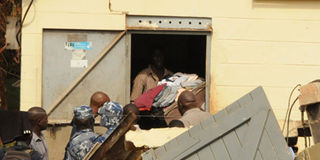Prime
Naguru estate hosting thieves

Law enforcers demolish the Naguru-Nakawa estates in 2011. FILE PHOTO
What you need to know:
Concern. The housing complex lies incomplete as thieves and ‘love-birds’ use the enclosed site as a hide-out.
Concern is high as to what is happening to the Naguru-Nakawa Housing Estate Project, 19 months after more than 1,750 families were acrimoniously evicted.
The project was shrouded in controversy between 2008 and 2010 and time and again failed to take-off due to politicking and court wrangles.
Most recently, however, reports indicate that the developer had failed to secure one of the three land titles belonging to the estates.
Residents have in the last year reported “strange happenings” within the iron-sheet-fenced 66 hectare complex.
The site has, in some quarters, been described as a “love nest”, with couples disappearing behind the perimeter enclosure only to emerge looking sheepish.
The homeless have also found a haven within the complex, turning it into “plush accommodation” even though the concrete structures have neither roofs, nor windows.
‘Paradise’
“It is a gangster’s paradise,” said a teenager at the Nakawa Market, who said he had seen thieves disappearing into the complex after executing their missions in the market.
Efforts by this newspaper to get official comment from Mr Hassan Kimbugwe, a director with OpecPrime Properties Uganda Limited - the developer, were futile, as his known mobile telephone number restricted in-coming calls.
However, an OpecPrime Properties official told this newspaper yesterday that architects from PLUS Architects, an Ireland-based architectural firm, were expected in the country next week, to “interface with the Lands ministry and KCCA”.
Blame-game
“We completed and submitted architectural designs for the “Satellite City” in December 2012,” the official said.
“We carried out demonstrations for KCCA. The authority has now allowed our designs to be incorporated in the 2040 Kampala MasterPlan.”
But KCCA said it had not received any architectural designs for the project from the developer.
“Opec Prime only presented a concept to management on how the Housing Project would look like on completion. We have never received any designs,” KCCA deputy spokesperson Robert Kalumba said.
“They said they would present the designs in phases. That is what we are waiting for to make approvals.”
This newspaper could not confirm any scheduled meetings with the Lands Ministry. Lands Minister Daudi Migereko is reportedly out of the country on official duty, while State minister Idah Nantaba’s known telephone number was unanswered.
Under an agreement, the developer is supposed to build 1,747 flats and related amenities for low-income earners.
Condemned by the Health ministry and the then Kampala City Council (now KCCA) as unfit for human inhabitation, the estates were tendered by government in 2003 for redevelopment.
At an estimated cost of $300 million, the government in 2007 contracted Opec Prime Properties to build a modern satellite city.



